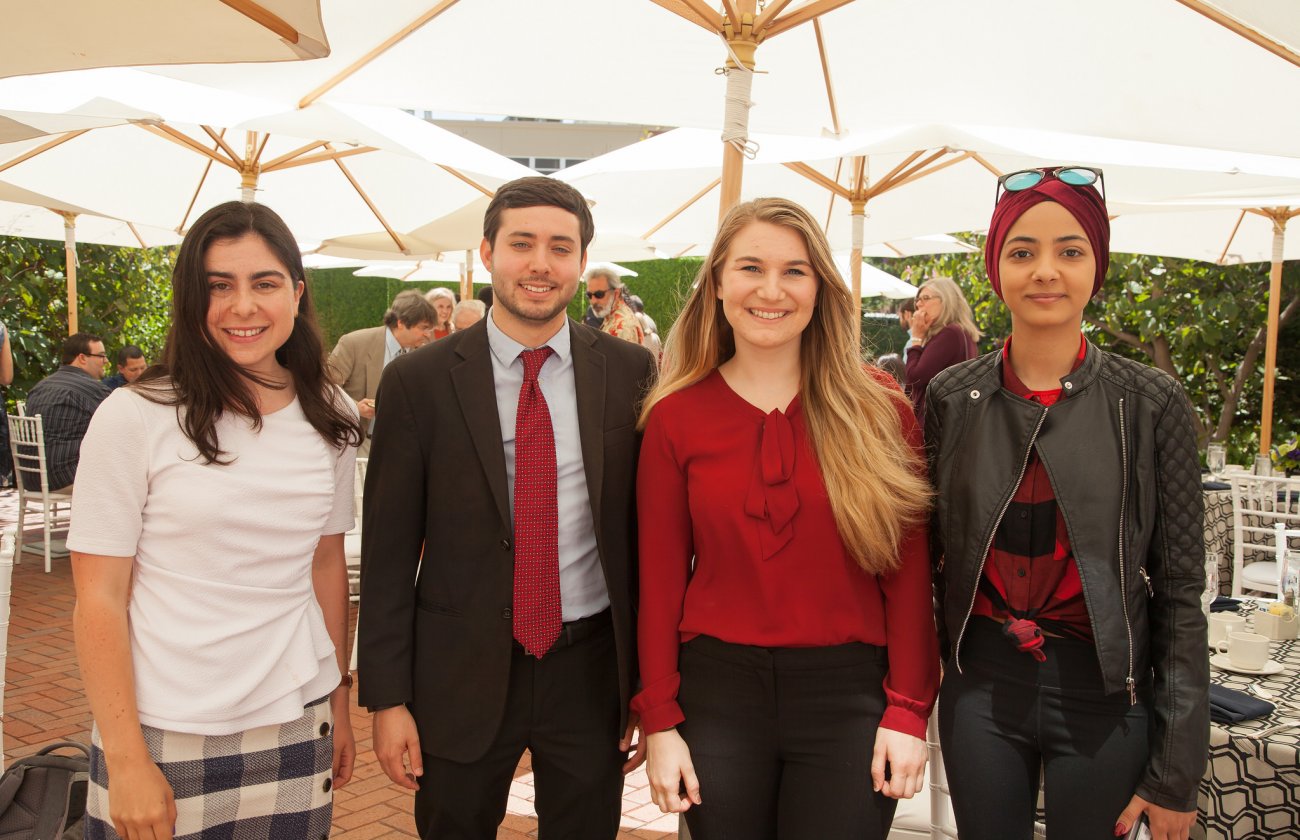Brian M. Rosenthal of the Houston Chronicle has won the 2017 Selden Ring Award for Investigative Reporting for his seven-part series revealing that Texas state educators systematically denied special education services to hundreds of thousands of schoolchildren with developmental, intellectual and physical disabilities.
The $35,000 annual Selden Ring Award, which the USC Annenberg School of Journalism has presented for 28 years, honors outstanding work in investigative journalism that leads to direct results.
“It is truly an honor for USC Annenberg to present this prestigious award, which reflects our deep commitment to a vital function of journalism,” said Willow Bay, director of the School of Journalism.
The Chronicle’s 10-month investigation, “Denied,” resulted in immediate and sweeping changes to state policy, freeing up benefits that may now help a countless number of children with disabilities. A bipartisan chorus of outrage in the Texas Legislature, blasting the “immeasurable” damage done to children, has led to eight bills being introduced to address the issues Rosenthal uncovered.
State education officials have agreed to end their decade-old cap on special education enrollments, federal regulators have launched an investigation and several large school districts have hired auditors to review their special education operations.
Selden Ring award judges wrote:
“Rosenthal's series, ‘Denied,’ vividly detailed the suffering caused by officials' imposition of an arbitrary cap on special ed, at levels far lower than elsewhere in the nation. His work prompted swift action, fundamentally rewriting access to education for hundreds of thousands of Texas' most vulnerable students and their families.”
The investigation was sparked by a tip Rosenthal, a Texas statehouse reporter, received from an advocate who was frustrated after many years of failed attempts to get qualified children into special education. He had heard about a “benchmark” – or cap – the state appeared to be using to limit special education to no more than 8.5 percent of schoolchildren.
The advocate complained to the state and federal government but was ignored, Rosenthal said.
“To be honest, it was a tip unlike anything I’d ever heard before,” he said. “The tip was that the state of Texas was systematically, secretly and illegally harming hundreds of thousands of kids. I don’t know if you can get a tip more dramatic than that.”
The work, Rosenthal said, was cut out for him.
“Most of the reporting, honestly, was done in an effort to try to debunk this tip. We came into the office day after day trying to figure out how it was possible that this policy could’ve existed for so long, and no one had written about it,” he said. “For a long time, I didn’t believe it was real. Sadly, our reporting found that it was.”
According to Rosenthal, the policy essentially was a tightly held secret, known only to a few state educators and school officials. The Legislature hadn’t approved it; the state Board of Education hadn’t discussed it; the federal government didn’t even know about it.
“The few people in special ed departments who knew about it either assumed it was a federal mandate or thought it was backed by research,” Rosenthal said. “Neither of those things was true. In reality, it was completely arbitrary.”
The policy was initially put into place in 2004 by the Texas Education Agency when it was facing a $1.1 billion state budget cut. At the time, about 12 percent of Texas students received special education services, just below the longtime national average. Over a dozen years, enrollment dropped to exactly 8.5 percent – by far the lowest rate nationwide.
When reporters and lawmakers asked about the reduction, state education officials did not disclose their cap. Instead, they claimed that innovative new teaching techniques had reduced the number of students in need of extra help.
The Chronicle’s reporting included interviews with more than 1,000 people, including 323 current and former educators and 391 parents who relayed how schools had denied services to their children.
In September 2016, after six months of reporting, the Chronicle published Part 1. The response was overwhelming. Hundreds of parents reached out to tell their stories. Educators, advocates and school officials reinforced Rosenthal’s reporting and wanted to add to it.
Before even concluding its investigation, federal officials ordered Texas to suspend the policy and eventually end it completely. Some school districts, including in Houston and Dallas, are hiring their own third-party investigators to review their special ed operations. Meanwhile, the state may be forced to pay remedies to the families who were harmed.
After Part 1, Rosenthal worked with photojournalist Marie D. De Jesús and reporters St. John Barned-Smith and Susan Carroll to publish six more installments over the next four months.
Many tips have come in from other states, he said. No other state has a cap on special ed enrollments, but some do frequently deny services that are guaranteed by federal law.
Winning the Selden Ring Award may shine light on an issue that needs it, Rosenthal said. “I hope this will raise awareness and serve as a reminder about the need for states to take seriously their responsibility to students with disabilities.”
Judges also recognized the work of two finalists:
“The Charleston Gazette-Mail, for its investigation of opioid distributors cascading drugs into West Virginia, ignoring evidence of abuse and worsening the state's addiction problems. This work epitomized the best of local public service journalism, taking aim at the most crucial problem afflicting the region and landing a tremendous blow. In this powerful series, the Gazette-Mail took on the pharmaceutical industry, calling out its role in fueling the epidemic.”
“The Sarasota Herald-Tribune, for ‘Bias on the Bench,’ a data-driven series proving what many have always suspected — that race figures heavily in sentencing in Florida criminal courts, keeping African Americans behind bars for substantially longer than whites who commit similar crimes.”
The Selden Ring Award has been part of USC Annenberg since 1989, when it was established by Southern California business leader and philanthropist Selden Ring. He wanted to honor journalists whose investigative work informed the public about major problems and corruption and yielded concrete results. The award continues, thanks to support from the Ring Foundation.
“The Selden Ring 2017 judges panel, with rich and varied expertise, includes some of the very best investigative reporters and editors in journalism,” Bay said. “We’d like to thank them for their considerable effort in selecting the winner from this year’s pool of nearly 70 submissions. The field included an abundance of high-quality investigative reporting and was extremely competitive.”
The panel this year included: Dean Baquet, Executive Editor of The New York Times; Robin Fields, Managing Editor of ProPublica; Wesley Lowery of The Washington Post; Kevin Merida, Editor-in-Chief of ESPN’s The Undefeated; and 2015 Selden Ring winners Audra D.S. Burch and Carol Marbin of The Miami Herald.
The Selden Ring Award for Investigative Reporting: A Look Back
For 28 years USC Annenberg has honored remarkable work in investigative journalism with the Selden Ring Award for Investigative Reporting. A $35,000 prize is presented annually to reporters whose work effected change.
“Seafood from Slaves” by The Associated Press wins USC Annenberg’s 2016 Selden Ring Award
A series of stories exposing how seafood sold in U.S. grocery stores and restaurants was produced by slaves. The AP’s work prompted reforms and prosecutions — and the release of more than 2,000 people who had been held captive.
2016 Selden Ring Award ceremony honors Associated Press' “Seafood from Slaves”
The multinational reporting team of Esther Htusan, Margie Mason, Robin McDowell and Martha Mendoza discussed their experiences writing "Seafood from Slaves" with an audience of students, faculty and staff during a special event in Wallis Annenberg Hall.
Gift from Ring Foundation funds USC Annenberg investigative reporting fellowship
Foundation’s gift offers new support for School of Journalism, longtime home of the Selden Ring Award. The Foundation pledged $1.4 million to fund an endowed fellowship for graduate students pursuing investigative journalism.







